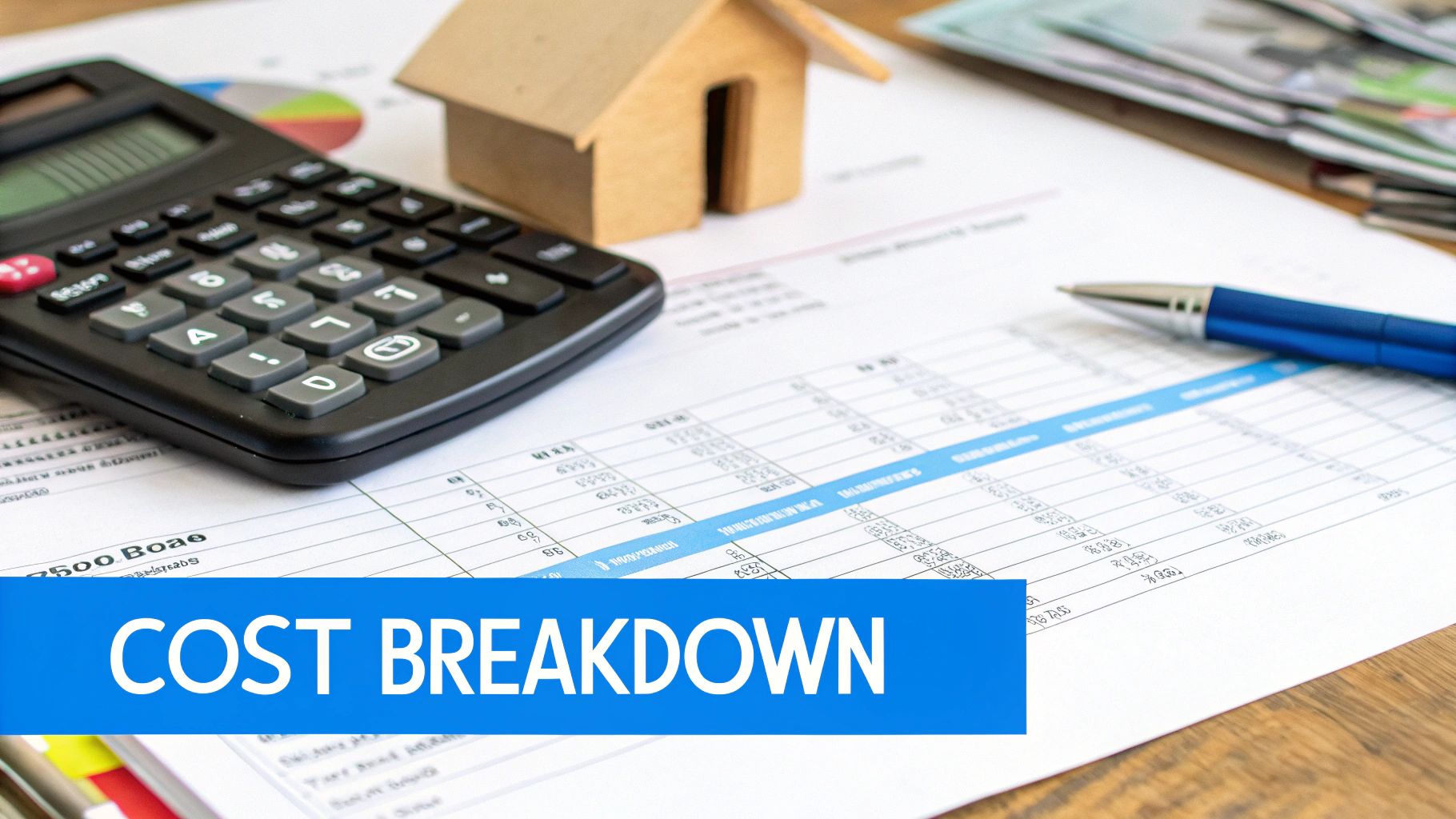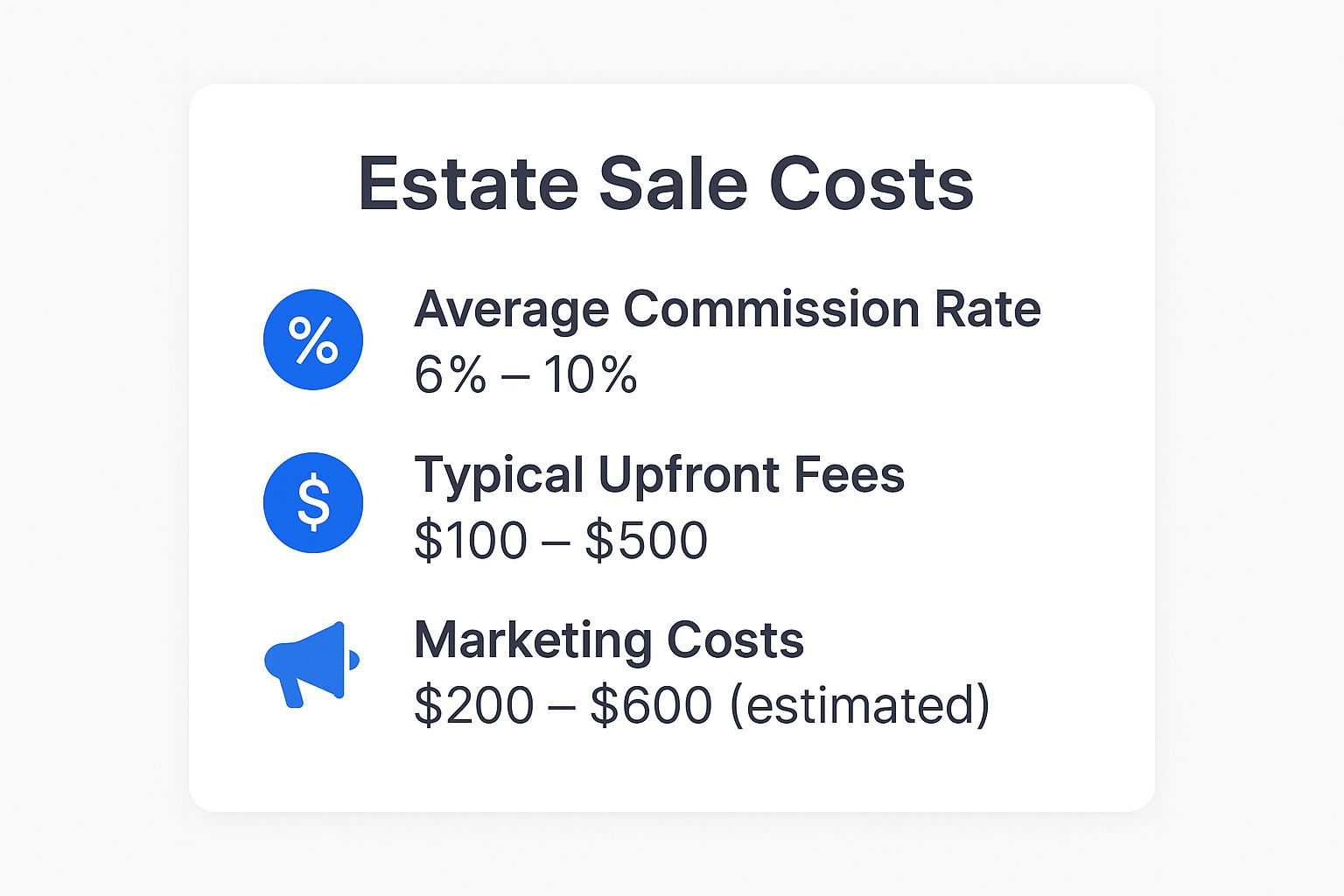What Is the Real Cost of an Estate Sale

When you start looking into estate sales, one of the first questions is always, "What's this going to cost me?" It's not as simple as a flat fee. Most professional companies work on a commission model, typically taking between 30% to 50% of the total sales.
This structure actually works in your favor. It means the company's success is directly tied to yours. The more money they make for you, the more they make for themselves—creating a powerful incentive to get the best possible prices for everything in the home.
What an Estate Sale Commission Actually Covers

It's easy to see the commission rate and think it's just for the few days the sale is open to the public. But that fee covers a massive amount of behind-the-scenes work that starts long before the first customer walks through the door.
Think of it as a full-service project management fee. The process kicks off with the monumental task of sorting through every single item in the house. Depending on the size and state of the estate, this alone can take days or even weeks. From there, the team meticulously researches and prices everything, from fine china to everyday tools, to hit that sweet spot of fair market value.
Staging and Marketing Your Sale
Once everything is priced, the real magic begins. The team transforms the home into a shoppable retail space, artfully staging furniture and displaying collectibles to catch a buyer's eye. This is professional merchandising, and it's a critical step in boosting the final sales total.
At the same time, they're launching a marketing blitz to get the word out. This isn't just a sign on the lawn; a modern estate sale campaign often includes:
- Professional Photography: High-quality photos showcasing the best items to create online buzz.
- Email Marketing: Reaching out to their dedicated list of thousands of local buyers and collectors.
- Online Listings: Posting the sale on specialized websites and social media to attract a wide audience.
- Neighborhood Signage: Guiding local traffic to the sale on the big days.
An estate sale company's real value isn't just in selling things—it's in maximizing the estate's total profit. Their expertise in pricing, staging, and marketing often brings in so much more that it easily covers their commission, leaving you with a higher net profit and none of the stress.
Of course, the commission rate is only half the equation. You also need a realistic idea of what the sale might bring in. Getting familiar with the average estate sale proceeds can help you set expectations and understand what your final payout might look like.
Finally, that commission also pays for the crew that runs the sale itself. They staff the event, manage the crowds, handle every transaction securely, and keep an eye on the home. After it's all over, you get a clear, detailed report showing exactly what sold and for how much.
To make it easier to see how these costs break down, here’s a quick overview of what you can generally expect.
Typical Estate Sale Cost Structures at a Glance
This table breaks down the common commission tiers and what they typically include.
| Commission Tier | Typical Percentage Range | Services Included | Potential Additional Costs |
|---|---|---|---|
| Standard Service | 35% - 50% | Sorting, pricing, staging, marketing, sale staffing, payment processing. | Trash hauling, deep cleaning, specialized appraisals. |
| High-Value Estates | 30% - 40% | All standard services, plus potential for enhanced marketing for specialty items. | Security guards, expert appraisals for fine art or jewelry. |
| Sliding Scale | Varies (e.g., 45% on first $10k, 35% on amounts over) | All standard services. The commission rate decreases as total sales increase. | Varies by company; may include any of the above. |
As you can see, the commission is rarely just a simple percentage. It’s a comprehensive fee for a turnkey service designed to liquidate an estate efficiently and profitably.
Key Factors That Influence Commission Rates
An estate sale company’s commission rate isn’t just pulled out of a hat. It’s a carefully calculated figure based on a few key variables inside the home. Think of it like a sliding scale—the more valuable and straightforward the project, the better the commission rate is likely to be for you.
Knowing what these factors are is a huge advantage. It helps you see the estate through a professional’s eyes, understand the quotes you’ll get, and maybe even find ways to lower your costs.
Total Estimated Value of Contents
The single biggest factor driving the cost of an estate sale is the total estimated value of everything in the home. It might seem odd, but a higher potential sales total usually means a lower commission percentage. It all comes down to simple business math.
A company can afford to take a smaller slice of a $50,000 sale than a $10,000 one because their final payout still covers all their time, labor, and marketing. If an estate is packed with in-demand antiques, fine jewelry, and quality furniture, it’s a much more attractive project, which gives you more room to negotiate.
An estate with a high concentration of valuable items is more attractive to a sale company. This often results in a lower commission rate for the client, as the company's profit is secured through the high value of the goods rather than a higher percentage of a smaller total.
On the flip side, an estate with a lower perceived value will almost always come with a higher commission rate. The company has to put in the same amount of work—sorting, staging, pricing, and marketing—so they need to make sure the job is financially worth their while. For a deeper dive, check out our complete guide on how estate sale commission rates are determined and what to expect.
Volume and Condition of Items
Next up is the sheer volume of items and the overall condition of the property. The amount of labor needed to get a sale ready directly impacts the commission. An organized, tidy home is a completely different project than a cluttered one that needs a major clean-out just to get started.
During an initial walkthrough, a professional is looking at a few things:
- Density of Items: Is the house packed to the gills, or is it sparsely furnished? A hoarding situation, for example, requires a massive number of labor hours just for sorting.
- Cleanliness: If a home needs a deep clean before items can even be properly displayed, that extra work gets factored into the cost.
- Organization: When items are already somewhat sorted or easy to get to, it cuts down on the prep time for the team.
A clean and organized home doesn't just make the setup faster. It also creates a much better shopping environment for buyers, which can boost the final sales numbers.
Presence of Specialty Collections
Finally, the type of items in the estate plays a huge role. A house filled with standard furniture and kitchenware is one thing, but an estate with specialty collections requires a whole different level of expertise.
This could include things like:
- Fine art or sculptures
- Rare coins or stamp collections
- Designer fashion and accessories
- Vintage firearms
- High-end collectible toys
Items like these need specialized knowledge to be priced correctly. The company might need to bring in an outside appraiser or spend a lot of time on research to make sure you get top dollar. That extra work can sometimes nudge the commission rate up, but it’s an investment that pays for itself by making sure a $5,000 painting isn’t sold for $50.
The property itself can also be a factor. For instance, luxury properties have continued to outperform the broader market, with home prices in this segment growing at a significantly faster rate. An estate sale held in a high-end property can attract more affluent buyers and command higher prices for its contents, a factor that companies consider when quoting their rates. You can discover more insights about trends in the luxury market from Coldwell Banker's 2025 Trend Report.
Navigating Hidden Fees and Additional Expenses

While the commission rate is the biggest piece of the puzzle, it’s rarely the only piece. Think of it like a car's sticker price—it’s the starting point, but the final cost often includes other services and features you might not have considered upfront. A truly professional company will be completely transparent about these, but it's on you to ask the right questions to avoid any nasty surprises on the final bill.
These extra expenses aren't usually "hidden fees" in a sneaky way. They're typically legitimate costs for services that fall outside the normal scope of simply running the sale. Getting a handle on them from the get-go is the key to accurately budgeting the total cost of an estate sale.
Common Charges Beyond the Commission
Every home is different, and some require a lot more elbow grease than others. A good contract will spell out exactly what's included in the commission and what will be billed separately. Keep an eye out for these common add-ons.
- Extra Labor and Clean-Out: If a home is packed to the gills or needs a serious deep clean before items can even be staged, the company will likely charge for the extra hours. This is especially common in hoarding situations or homes that have sat empty for a while.
- Specialized Appraisals: Your estate sale team can price most household goods, but what about a collection of fine art, rare stamps, or high-end jewelry? Those often need a certified appraiser to get the value right. That appraiser's fee is usually passed on to you, but it’s a smart investment to make sure you get top dollar.
- Heavy Item Moving: Got a grand piano, a slate pool table, or a giant safe? Moving those beasts requires special equipment and professional muscle. The cost for that is almost always an extra charge.
- Dedicated Marketing Campaigns: Standard marketing—like emails to their buyer list and local signs—is almost always included. But if you want a targeted social media ad blitz or ads placed in niche collector magazines, that will likely cost extra.
A huge red flag is any company that's vague about their fee structure. A pro will hand you a detailed, written contract that outlines every single potential charge, giving you the full financial picture before you sign anything.
Post-Sale Services That Add to the Cost
The job isn't always done when the last shopper walks out the door. Dealing with what’s left over is another area where extra fees can pop up. Any professional contract worth its salt will have a clear plan for unsold items.
You might see charges for things like:
- Trash Hauling and Disposal: Not everything is going to sell. Companies often charge a fee to haul away the remaining trash and unsellable items. Expect this to run anywhere from $50 to $150 per truckload, plus any landfill fees.
- Credit Card Processing: To make it easy for buyers, nearly all sales accept credit cards. Those transaction fees, usually 3% to 5% of the sale, are sometimes passed on to the client. Make sure you clarify whether the company absorbs this or if it comes out of your share.
- Temporary Storage: If some items need to be held after the sale or stored during the transition, knowing your options can save you money. Spending a little time learning about choosing a suitable storage facility can be a smart financial move to avoid unexpected bills.
By bringing up these potential costs during your initial interviews, you can compare companies apples-to-apples and build a realistic budget for your sale. A transparent contract is the foundation for a successful, stress-free estate liquidation.
How Location and Market Conditions Affect Your Costs

When it comes to the cost of an estate sale, the contents of the home are only half the story. The "where" can be just as important as the "what." Your geography and the local market conditions play a huge role in everything from commission rates to the final check you receive.
It’s just like the old real estate mantra: "location, location, location." An estate sale company in a bustling city with a high cost of living has bigger bills to pay—rent, staff wages, and advertising all cost a premium. To cover that overhead, their commission rates might be a few points higher than a company's in a quiet, rural town.
Urban, Suburban, and Rural Cost Differences
The type and number of buyers change dramatically from one area to the next. Each environment has its own unique set of pros and cons that will shape the cost and success of your sale.
- Major Urban Centers: Big cities have a massive built-in audience of buyers and specialized collectors. This can definitely drive up prices, but the company's operating costs are also much higher, which you'll see reflected in their commission.
- Suburban Communities: The suburbs are often the sweet spot. You get strong local demand and easy-to-access properties, but the operating costs for the sale company are more reasonable. This balance can lead to some of the most competitive commission rates.
- Rural Areas: Out in the country, companies have to work harder to pull in buyers from farther away. That extra marketing push and travel time for the crew might mean higher commissions or a minimum sales guarantee to make the trip worthwhile for them.
Think of it this way: your local market sets the stage for your sale. A hot, high-demand area can mean higher final sales, while a slower market requires a much smarter strategy to hit your financial goals.
Keeping these regional differences in mind helps you set realistic expectations when you start getting quotes. A 40% commission in a high-cost city might actually be a better deal than a 35% commission in a rural area with almost no buyer traffic.
How Broader Economic Trends Play a Role
Looking beyond your immediate zip code, the wider economy has a real impact. For example, a booming local housing market is fantastic for an estate sale. New homeowners are flooding into the area, and they're all looking to furnish their new places. You've got a ready-made audience for furniture, decor, and household goods.
On the flip side, a sluggish economy makes buyers hold onto their wallets a little tighter. In those times, an experienced company's marketing savvy and pricing expertise are absolutely essential to get people in the door and maximize what you earn. Even global trends can trickle down to your sale; the UBS Global Real Estate Bubble Index, for instance, tracks economic pressures that can influence local property and item values.
At the end of the day, a great sale comes down to the company's ability to read these local and national tea leaves, ensuring your items are priced and promoted perfectly for the current market.
Comparing DIY vs. Professional Estate Sales
When it's time to liquidate an estate, you'll find yourself at a major crossroads. Do you roll up your sleeves and run the sale yourself? Or do you hand the keys over to a professional company? This decision is about more than just the final cost—it will shape your time commitment, stress level, and ultimately, how much money you walk away with.
The appeal of a Do-It-Yourself (DIY) sale is easy to see: you keep 100% of the profits. With no commission to pay, every single dollar goes straight into your pocket. But that path comes with a serious price tag of its own, measured in your time, energy, and a few hidden costs you might not see coming.
The True Cost of a DIY Estate Sale
Going the DIY route means you instantly become the project manager, appraiser, marketer, and sales clerk, all rolled into one. The sheer amount of work is often staggering, easily taking 80 to 120 hours for an average home. This isn't just about moving boxes; it's mentally and emotionally draining work.
And then there are the hidden risks:
- Pricing Errors: This is the biggest one. Without years of market experience, it's incredibly easy to underprice a valuable antique or overprice everyday items, which scares buyers away. Leaving just a few hundred dollars on the table can completely wipe out the money you "saved" by not paying a commission.
- Your Time is Money: Every hour spent sorting, cleaning, and researching is an hour you can't spend on anything else. Your time has real value, and a DIY sale demands a massive amount of it.
- Liability and Security: You are personally on the hook for any accidents that happen on the property during the sale. You also have to play security guard to prevent theft and handle any payment squabbles yourself.
- The Emotional Toll: Sifting through a lifetime of memories is tough. Trying to put a price tag on sentimental belongings adds a layer of stress that many people find completely overwhelming.
This infographic gives a quick snapshot of the typical costs involved when hiring a professional, which helps put the DIY vs. pro debate into financial perspective.

While a pro service charges a commission, you can see that other expenses like marketing are often minimal or just bundled in, which really simplifies the money side of things.
The Value of Bringing in a Professional
Hiring an experienced company completely flips the financial script. Instead of keeping 100% of a smaller pie, you pay a commission to get a much bigger one. That 30% to 50% fee is an investment in expertise that, more often than not, results in a higher net profit than you could ever achieve on your own.
Think of it this way: A pro company charges a 40% commission. Thanks to their expert pricing and massive buyer network, they gross $20,000. Your take-home is $12,000. If you did it all yourself and only grossed $12,000 because of pricing mistakes and less foot traffic, you end up with the same amount of cash—but you did all the work.
Professionals bring a powerful set of tools to the job. Their established email lists and social media followings can bring hundreds—sometimes thousands—of eager buyers to your door. Their experience lets them price every item for its maximum value, and their team handles all the heavy lifting, staging, and stressful sale-day chaos. You can dive deeper into the benefits and what to expect in this guide to professional estate sales.
To make it even clearer, let's look at how these two paths really stack up.
DIY vs. Professional Estate Sale: A Head-to-Head Comparison
Choosing between running your own sale and hiring a pro is a big decision with real consequences for your wallet, your schedule, and your sanity. This table breaks down what you can expect from each approach.
| Factor | DIY Estate Sale | Professional Estate Sale Company |
|---|---|---|
| Upfront Costs | Minimal; mostly for supplies and any advertising you choose to buy. | Typically none. All fees are taken from the final sale proceeds. |
| Your Time | Extremely high; plan for 80+ hours of sorting, pricing, and managing the sale. | Very low; requires only an initial consultation and final sign-off. |
| Pricing Expertise | Limited to your own research, risking major underpricing of valuables. | Deep market knowledge ensures every item is priced for maximum return. |
| Marketing Power | Limited to your personal network, social media, and local classifieds. | Access to large, established email lists and targeted online marketing. |
| Physical Labor | You're responsible for all the moving, staging, and post-sale clean-up. | A full team handles all physical work from setup to breakdown. |
| Legal & Safety | You assume all liability for accidents, theft, and payment fraud. | The company is insured and bonded, protecting you from all liability. |
| Emotional Burden | High; you must personally handle sentimental items and haggle with buyers. | Minimal; pros provide an objective buffer, managing the entire process for you. |
Ultimately, the right choice really depends on your unique situation. If you're dealing with a very small estate, have tons of free time, and feel confident in your knowledge of item values, a DIY sale could work. For most people, however, the expertise, efficiency, and sheer peace of mind a professional service offers provides a far greater return on their investment.
Actionable Strategies to Reduce Estate Sale Costs
Knowing how estate sale fees work is one thing, but actively managing those costs is how you put more money back in your pocket. The commission rate feels like a fixed number, but you have more influence over it than you might realize.
By being a proactive partner in the process, you can make the entire sale more efficient and appealing to a professional company. And that often translates into better terms for you.
Prepare the Property Before You Call
One of the best things you can do to lower costs is to cut down on the labor the estate sale company has to do. Before you even pick up the phone to interview companies, handle some basic prep work yourself.
This isn’t about pricing your own stuff or trying to stage the living room—definitely leave that to the pros. Your job is to focus on the obvious clutter.
- Secure Personal Items: Go through the house and box up all family photos, important documents, and any heirlooms you're definitely keeping. This protects your privacy and ensures nothing precious gets sold by mistake.
- Toss the Real Trash: Get rid of actual garbage. We’re talking about expired food in the pantry, broken electronics, and other truly unsellable items. The less a company has to haul to the dump, the lower your clean-out fees will be.
A clean, organized home sends a powerful signal to an estate sale company: this job will be straightforward. That can easily lead to a better commission rate because they know their team will spend less time on basic cleanup and more time on high-value tasks like researching and marketing your items.
Interview Multiple Companies and Compare Value
Don't just accept the first quote you get. It’s smart practice to interview at least three reputable estate sale companies to understand the local market and find the right fit. But remember, this isn’t just about hunting for the lowest commission rate.
The cheapest company is only a deal if they deliver great results. Think about it this way:
A company charging 40% that brings in $20,000 nets you $12,000. Another company charging a lower 30% but only bringing in $12,000 leaves you with just $8,400. The expert with the higher commission just earned you thousands more.
When you compare companies, focus on the overall value they bring. Ask about their marketing strategies, their experience with specialty items like yours, and what their plan is for anything that doesn't sell. A solid post-sale plan that includes buyouts or well-managed donations can dramatically increase your final payout, making a slightly higher commission a very wise investment.
Got Questions? Let's Talk Estate Sale Costs
Even after you get the basic rundown of commissions and fees, a few specific questions always seem to pop up. It's totally normal. Budgeting for an estate sale can feel a little murky at first, so let's clear the air and tackle the most common things people ask.
Is the Commission Rate Set in Stone?
Most of the time, there’s some wiggle room. While estate sale companies have their standard rates, they're often open to a conversation, especially if you have a really desirable estate on your hands. Think about it from their perspective: if your home is packed with high-value antiques, collectibles, or designer goods, their job is easier and more profitable. Less risk for them could mean a better rate for you.
It never hurts to ask for a bit of flexibility. But remember, the cheapest option isn't always the best deal. A company with a slightly higher commission might have a massive following of buyers and the expertise to price items for maximum return, ultimately making you far more money. It’s an investment in their skill.
Do I Have to Pay Anything Upfront?
Absolutely not. A reputable, professional estate sale company will never, ever ask for money before the sale is over. Their entire business model is based on performance—they get paid when you get paid.
This is a big one: if any company asks for a hefty deposit or a "setup fee" before they even start, consider it a giant red flag. All their costs, from labor to marketing, should come out of the proceeds after the sale is complete.
What Happens if the Sale Doesn't Earn Enough to Cover the Company's Minimum?
This is probably one of the most important questions you can ask when you’re interviewing companies. Many have a minimum commission they need to earn to make the project worthwhile. After all, they’re investing weeks of labor, and this minimum ensures they can cover their costs even if the sale underperforms.
A good contract will spell this policy out in black and white. If the total sales don't generate their minimum fee, the estate might have to cover the difference. For example, if their minimum is $4,000 but the commission from the sale only adds up to $3,500, you could be on the hook for that $500 gap. Make sure you understand this clause completely and are comfortable with the terms before signing on the dotted line.